Unilever: Contemporary Business Environment Analysis and SWOT
VerifiedAdded on 2023/01/13
|13
|3843
|83
Report
AI Summary
This report provides a comprehensive analysis of Unilever's business environment, focusing on the impact of economic, non-economic, cultural, and natural factors on the company's operations. It explores the influence of the UK's economic conditions, including the effects of Brexit, on Unilever's performance. The report examines the political, legal, socio-cultural, technological, and demographic environments, assessing their implications for Unilever's strategies and market position. Furthermore, it analyzes the natural environment, including environmental awareness and Unilever's sustainability initiatives. The report culminates in a SWOT analysis, evaluating Unilever's strengths, weaknesses, opportunities, and threats, to provide insights into its strategic positioning and future prospects in the competitive global market. The document is contributed by a student to be published on the website Desklib. Desklib is a platform which provides all the necessary AI based study tools for students.
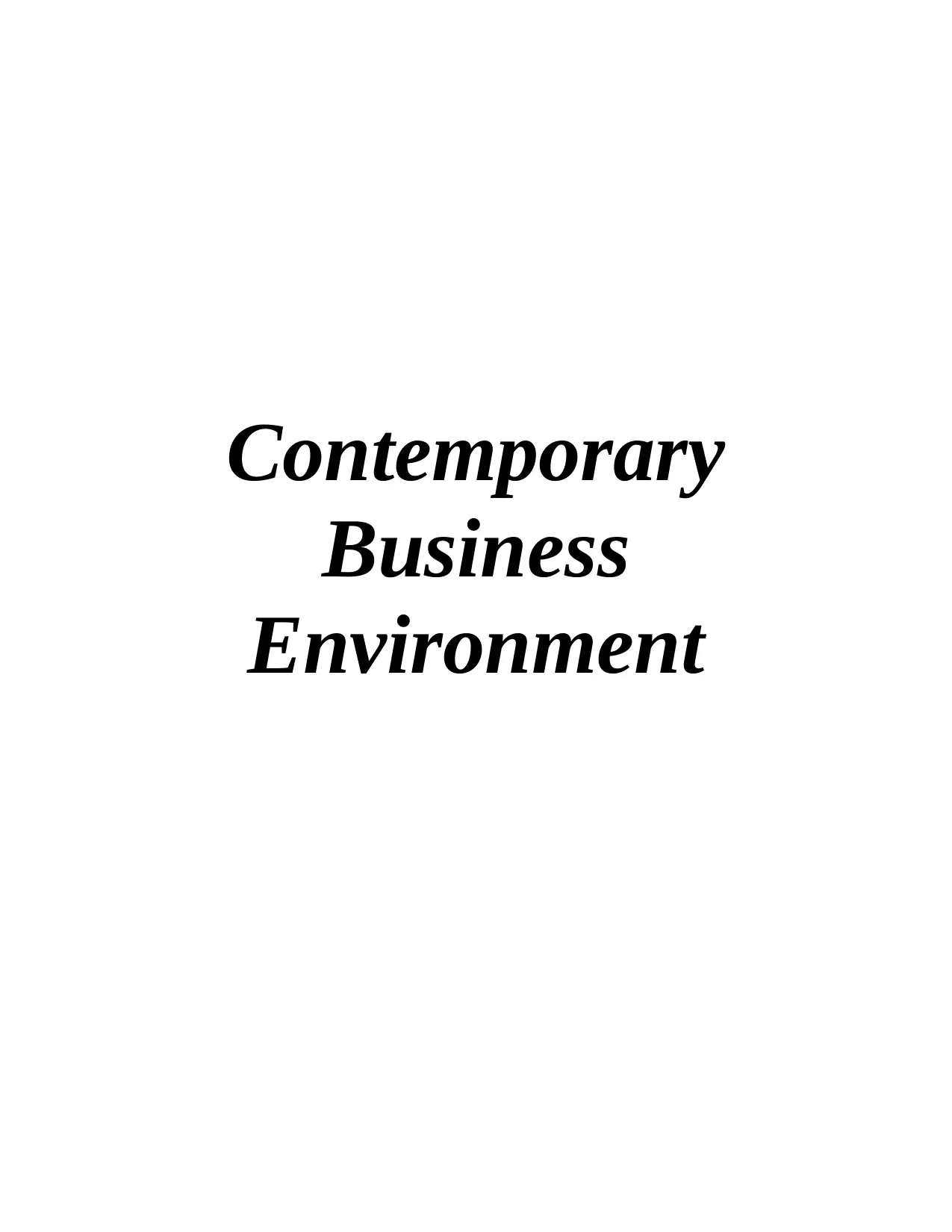
Contemporary
Business
Environment
Business
Environment
Paraphrase This Document
Need a fresh take? Get an instant paraphrase of this document with our AI Paraphraser
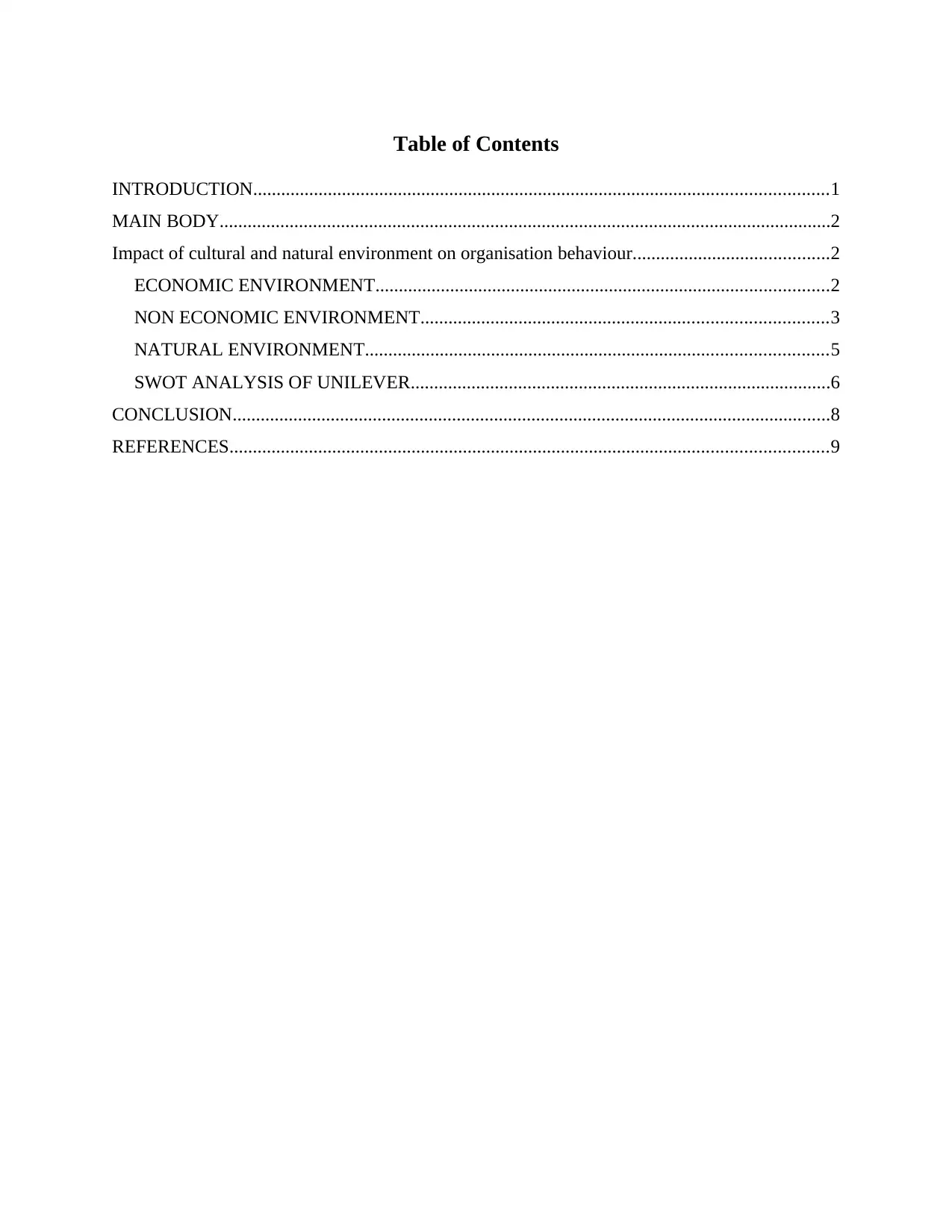
Table of Contents
INTRODUCTION...........................................................................................................................1
MAIN BODY...................................................................................................................................2
Impact of cultural and natural environment on organisation behaviour..........................................2
ECONOMIC ENVIRONMENT.................................................................................................2
NON ECONOMIC ENVIRONMENT.......................................................................................3
NATURAL ENVIRONMENT...................................................................................................5
SWOT ANALYSIS OF UNILEVER..........................................................................................6
CONCLUSION................................................................................................................................8
REFERENCES................................................................................................................................9
INTRODUCTION...........................................................................................................................1
MAIN BODY...................................................................................................................................2
Impact of cultural and natural environment on organisation behaviour..........................................2
ECONOMIC ENVIRONMENT.................................................................................................2
NON ECONOMIC ENVIRONMENT.......................................................................................3
NATURAL ENVIRONMENT...................................................................................................5
SWOT ANALYSIS OF UNILEVER..........................................................................................6
CONCLUSION................................................................................................................................8
REFERENCES................................................................................................................................9

You're viewing a preview
Unlock full access by subscribing today!
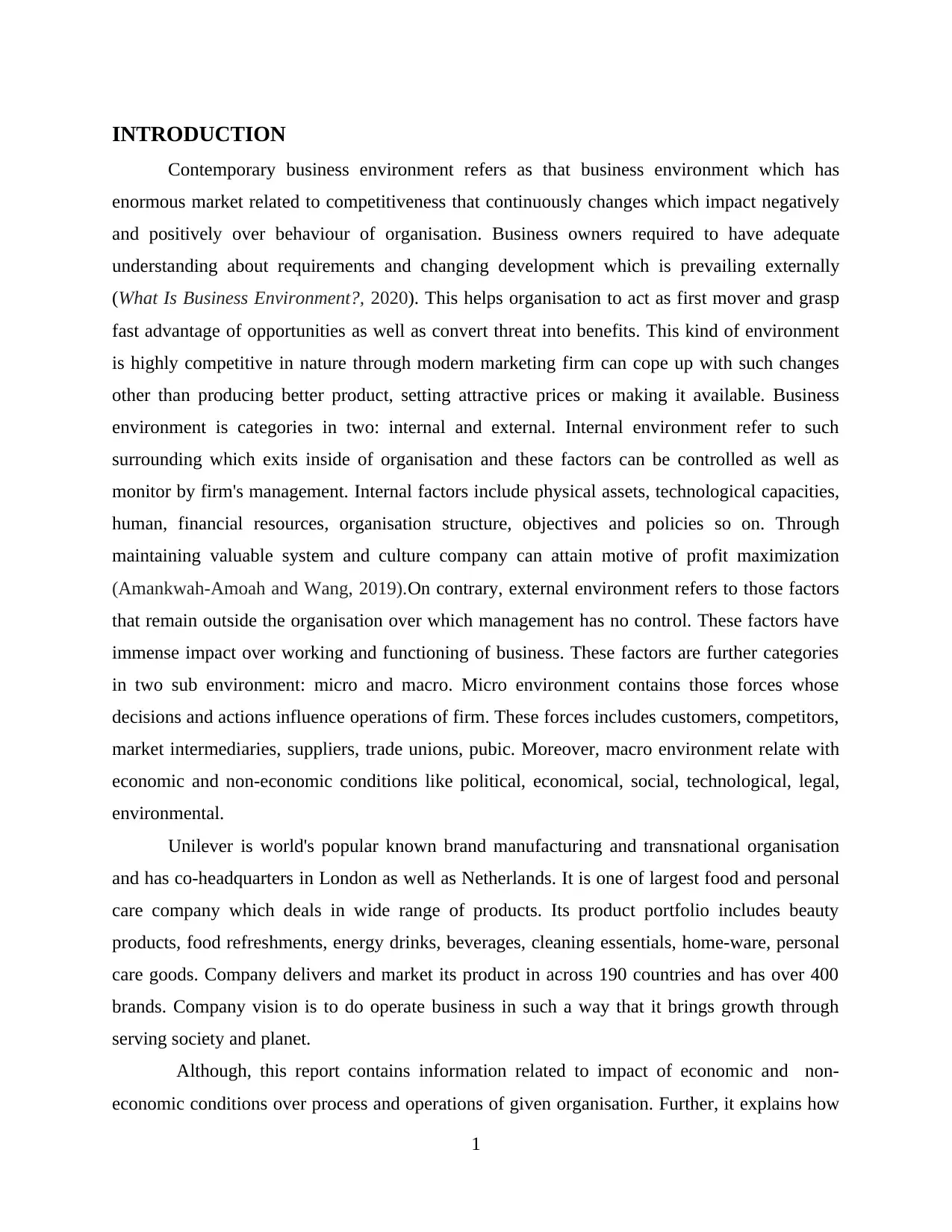
INTRODUCTION
Contemporary business environment refers as that business environment which has
enormous market related to competitiveness that continuously changes which impact negatively
and positively over behaviour of organisation. Business owners required to have adequate
understanding about requirements and changing development which is prevailing externally
(What Is Business Environment?, 2020). This helps organisation to act as first mover and grasp
fast advantage of opportunities as well as convert threat into benefits. This kind of environment
is highly competitive in nature through modern marketing firm can cope up with such changes
other than producing better product, setting attractive prices or making it available. Business
environment is categories in two: internal and external. Internal environment refer to such
surrounding which exits inside of organisation and these factors can be controlled as well as
monitor by firm's management. Internal factors include physical assets, technological capacities,
human, financial resources, organisation structure, objectives and policies so on. Through
maintaining valuable system and culture company can attain motive of profit maximization
(Amankwah-Amoah and Wang, 2019).On contrary, external environment refers to those factors
that remain outside the organisation over which management has no control. These factors have
immense impact over working and functioning of business. These factors are further categories
in two sub environment: micro and macro. Micro environment contains those forces whose
decisions and actions influence operations of firm. These forces includes customers, competitors,
market intermediaries, suppliers, trade unions, pubic. Moreover, macro environment relate with
economic and non-economic conditions like political, economical, social, technological, legal,
environmental.
Unilever is world's popular known brand manufacturing and transnational organisation
and has co-headquarters in London as well as Netherlands. It is one of largest food and personal
care company which deals in wide range of products. Its product portfolio includes beauty
products, food refreshments, energy drinks, beverages, cleaning essentials, home-ware, personal
care goods. Company delivers and market its product in across 190 countries and has over 400
brands. Company vision is to do operate business in such a way that it brings growth through
serving society and planet.
Although, this report contains information related to impact of economic and non-
economic conditions over process and operations of given organisation. Further, it explains how
1
Contemporary business environment refers as that business environment which has
enormous market related to competitiveness that continuously changes which impact negatively
and positively over behaviour of organisation. Business owners required to have adequate
understanding about requirements and changing development which is prevailing externally
(What Is Business Environment?, 2020). This helps organisation to act as first mover and grasp
fast advantage of opportunities as well as convert threat into benefits. This kind of environment
is highly competitive in nature through modern marketing firm can cope up with such changes
other than producing better product, setting attractive prices or making it available. Business
environment is categories in two: internal and external. Internal environment refer to such
surrounding which exits inside of organisation and these factors can be controlled as well as
monitor by firm's management. Internal factors include physical assets, technological capacities,
human, financial resources, organisation structure, objectives and policies so on. Through
maintaining valuable system and culture company can attain motive of profit maximization
(Amankwah-Amoah and Wang, 2019).On contrary, external environment refers to those factors
that remain outside the organisation over which management has no control. These factors have
immense impact over working and functioning of business. These factors are further categories
in two sub environment: micro and macro. Micro environment contains those forces whose
decisions and actions influence operations of firm. These forces includes customers, competitors,
market intermediaries, suppliers, trade unions, pubic. Moreover, macro environment relate with
economic and non-economic conditions like political, economical, social, technological, legal,
environmental.
Unilever is world's popular known brand manufacturing and transnational organisation
and has co-headquarters in London as well as Netherlands. It is one of largest food and personal
care company which deals in wide range of products. Its product portfolio includes beauty
products, food refreshments, energy drinks, beverages, cleaning essentials, home-ware, personal
care goods. Company delivers and market its product in across 190 countries and has over 400
brands. Company vision is to do operate business in such a way that it brings growth through
serving society and planet.
Although, this report contains information related to impact of economic and non-
economic conditions over process and operations of given organisation. Further, it explains how
1
Paraphrase This Document
Need a fresh take? Get an instant paraphrase of this document with our AI Paraphraser
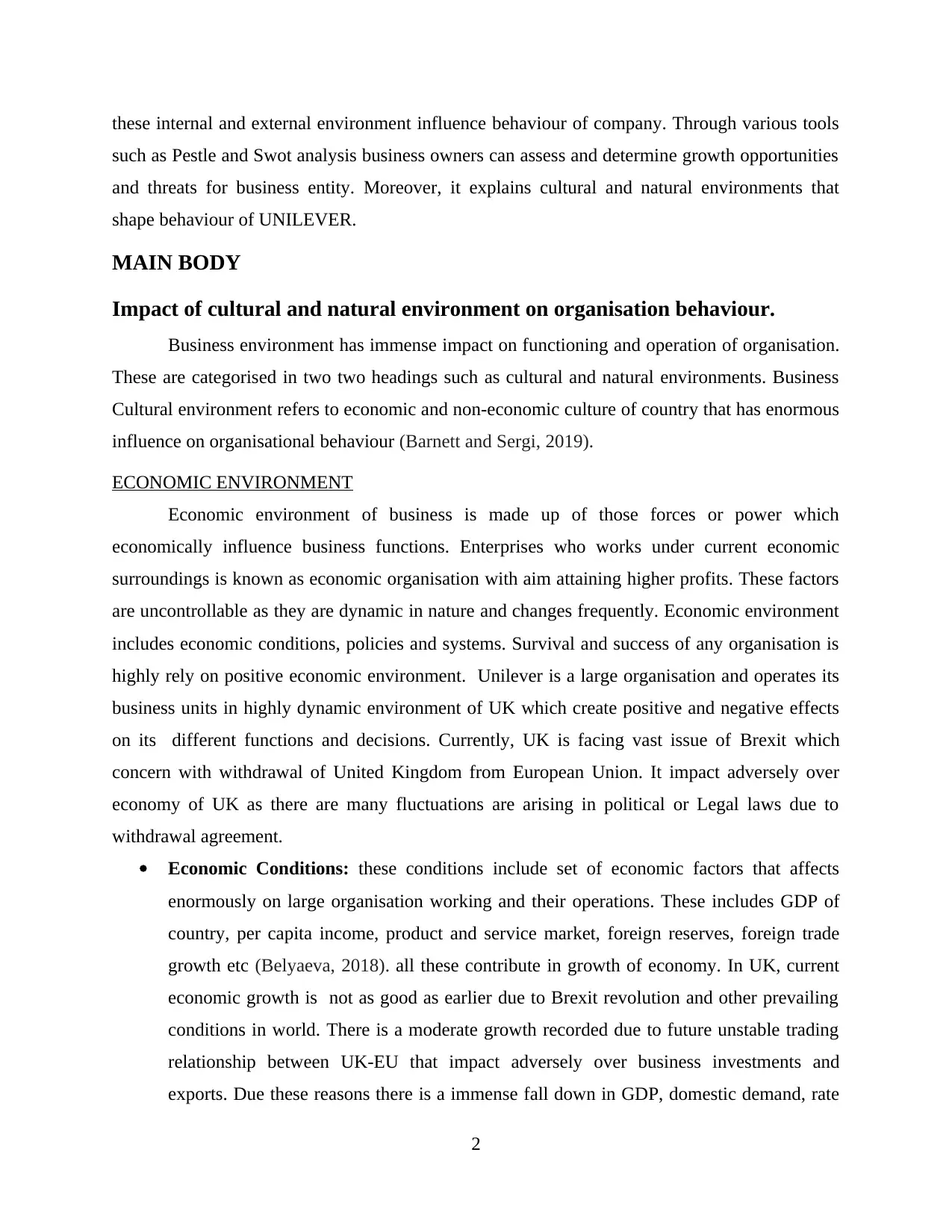
these internal and external environment influence behaviour of company. Through various tools
such as Pestle and Swot analysis business owners can assess and determine growth opportunities
and threats for business entity. Moreover, it explains cultural and natural environments that
shape behaviour of UNILEVER.
MAIN BODY
Impact of cultural and natural environment on organisation behaviour.
Business environment has immense impact on functioning and operation of organisation.
These are categorised in two two headings such as cultural and natural environments. Business
Cultural environment refers to economic and non-economic culture of country that has enormous
influence on organisational behaviour (Barnett and Sergi, 2019).
ECONOMIC ENVIRONMENT
Economic environment of business is made up of those forces or power which
economically influence business functions. Enterprises who works under current economic
surroundings is known as economic organisation with aim attaining higher profits. These factors
are uncontrollable as they are dynamic in nature and changes frequently. Economic environment
includes economic conditions, policies and systems. Survival and success of any organisation is
highly rely on positive economic environment. Unilever is a large organisation and operates its
business units in highly dynamic environment of UK which create positive and negative effects
on its different functions and decisions. Currently, UK is facing vast issue of Brexit which
concern with withdrawal of United Kingdom from European Union. It impact adversely over
economy of UK as there are many fluctuations are arising in political or Legal laws due to
withdrawal agreement.
Economic Conditions: these conditions include set of economic factors that affects
enormously on large organisation working and their operations. These includes GDP of
country, per capita income, product and service market, foreign reserves, foreign trade
growth etc (Belyaeva, 2018). all these contribute in growth of economy. In UK, current
economic growth is not as good as earlier due to Brexit revolution and other prevailing
conditions in world. There is a moderate growth recorded due to future unstable trading
relationship between UK-EU that impact adversely over business investments and
exports. Due these reasons there is a immense fall down in GDP, domestic demand, rate
2
such as Pestle and Swot analysis business owners can assess and determine growth opportunities
and threats for business entity. Moreover, it explains cultural and natural environments that
shape behaviour of UNILEVER.
MAIN BODY
Impact of cultural and natural environment on organisation behaviour.
Business environment has immense impact on functioning and operation of organisation.
These are categorised in two two headings such as cultural and natural environments. Business
Cultural environment refers to economic and non-economic culture of country that has enormous
influence on organisational behaviour (Barnett and Sergi, 2019).
ECONOMIC ENVIRONMENT
Economic environment of business is made up of those forces or power which
economically influence business functions. Enterprises who works under current economic
surroundings is known as economic organisation with aim attaining higher profits. These factors
are uncontrollable as they are dynamic in nature and changes frequently. Economic environment
includes economic conditions, policies and systems. Survival and success of any organisation is
highly rely on positive economic environment. Unilever is a large organisation and operates its
business units in highly dynamic environment of UK which create positive and negative effects
on its different functions and decisions. Currently, UK is facing vast issue of Brexit which
concern with withdrawal of United Kingdom from European Union. It impact adversely over
economy of UK as there are many fluctuations are arising in political or Legal laws due to
withdrawal agreement.
Economic Conditions: these conditions include set of economic factors that affects
enormously on large organisation working and their operations. These includes GDP of
country, per capita income, product and service market, foreign reserves, foreign trade
growth etc (Belyaeva, 2018). all these contribute in growth of economy. In UK, current
economic growth is not as good as earlier due to Brexit revolution and other prevailing
conditions in world. There is a moderate growth recorded due to future unstable trading
relationship between UK-EU that impact adversely over business investments and
exports. Due these reasons there is a immense fall down in GDP, domestic demand, rate
2
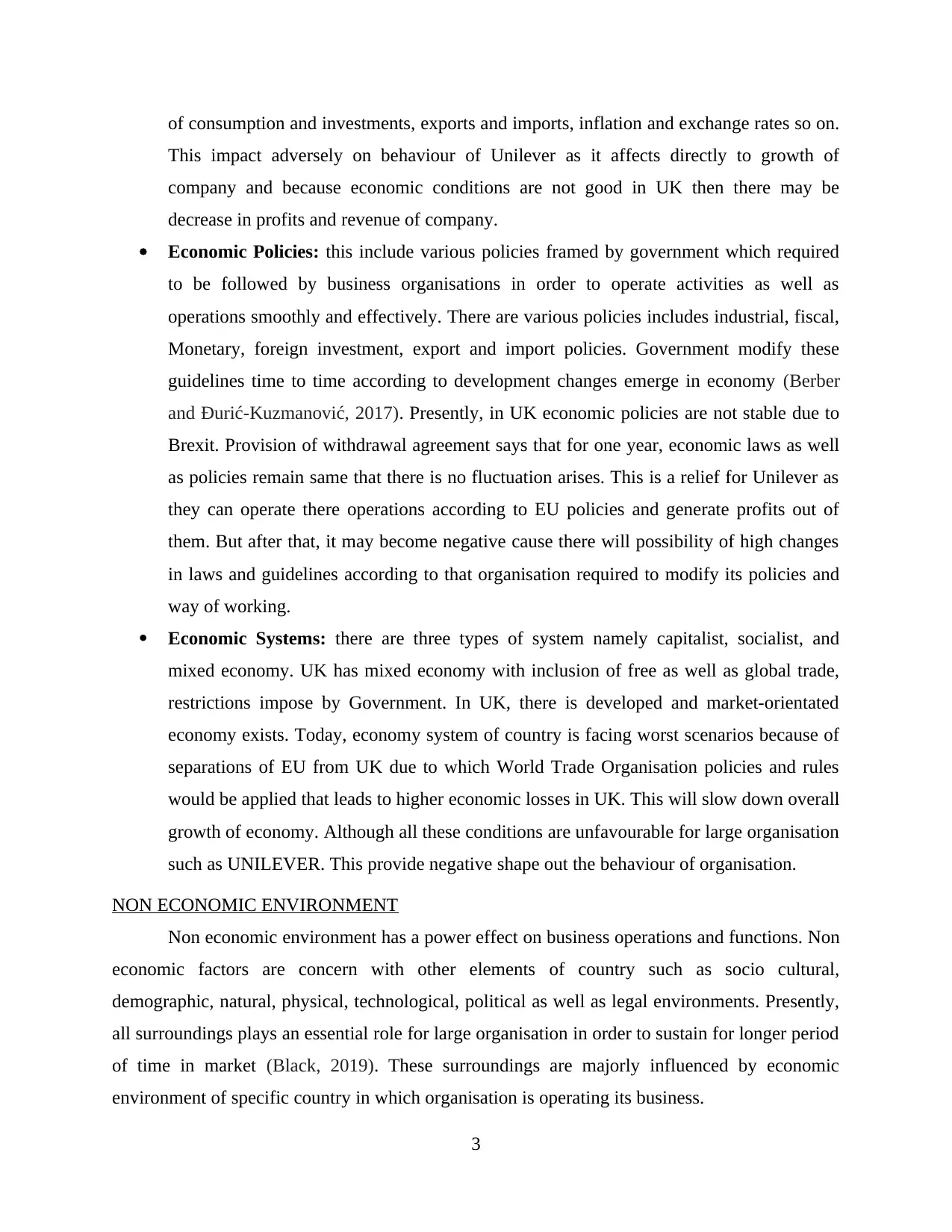
of consumption and investments, exports and imports, inflation and exchange rates so on.
This impact adversely on behaviour of Unilever as it affects directly to growth of
company and because economic conditions are not good in UK then there may be
decrease in profits and revenue of company.
Economic Policies: this include various policies framed by government which required
to be followed by business organisations in order to operate activities as well as
operations smoothly and effectively. There are various policies includes industrial, fiscal,
Monetary, foreign investment, export and import policies. Government modify these
guidelines time to time according to development changes emerge in economy (Berber
and Đurić-Kuzmanović, 2017). Presently, in UK economic policies are not stable due to
Brexit. Provision of withdrawal agreement says that for one year, economic laws as well
as policies remain same that there is no fluctuation arises. This is a relief for Unilever as
they can operate there operations according to EU policies and generate profits out of
them. But after that, it may become negative cause there will possibility of high changes
in laws and guidelines according to that organisation required to modify its policies and
way of working.
Economic Systems: there are three types of system namely capitalist, socialist, and
mixed economy. UK has mixed economy with inclusion of free as well as global trade,
restrictions impose by Government. In UK, there is developed and market-orientated
economy exists. Today, economy system of country is facing worst scenarios because of
separations of EU from UK due to which World Trade Organisation policies and rules
would be applied that leads to higher economic losses in UK. This will slow down overall
growth of economy. Although all these conditions are unfavourable for large organisation
such as UNILEVER. This provide negative shape out the behaviour of organisation.
NON ECONOMIC ENVIRONMENT
Non economic environment has a power effect on business operations and functions. Non
economic factors are concern with other elements of country such as socio cultural,
demographic, natural, physical, technological, political as well as legal environments. Presently,
all surroundings plays an essential role for large organisation in order to sustain for longer period
of time in market (Black, 2019). These surroundings are majorly influenced by economic
environment of specific country in which organisation is operating its business.
3
This impact adversely on behaviour of Unilever as it affects directly to growth of
company and because economic conditions are not good in UK then there may be
decrease in profits and revenue of company.
Economic Policies: this include various policies framed by government which required
to be followed by business organisations in order to operate activities as well as
operations smoothly and effectively. There are various policies includes industrial, fiscal,
Monetary, foreign investment, export and import policies. Government modify these
guidelines time to time according to development changes emerge in economy (Berber
and Đurić-Kuzmanović, 2017). Presently, in UK economic policies are not stable due to
Brexit. Provision of withdrawal agreement says that for one year, economic laws as well
as policies remain same that there is no fluctuation arises. This is a relief for Unilever as
they can operate there operations according to EU policies and generate profits out of
them. But after that, it may become negative cause there will possibility of high changes
in laws and guidelines according to that organisation required to modify its policies and
way of working.
Economic Systems: there are three types of system namely capitalist, socialist, and
mixed economy. UK has mixed economy with inclusion of free as well as global trade,
restrictions impose by Government. In UK, there is developed and market-orientated
economy exists. Today, economy system of country is facing worst scenarios because of
separations of EU from UK due to which World Trade Organisation policies and rules
would be applied that leads to higher economic losses in UK. This will slow down overall
growth of economy. Although all these conditions are unfavourable for large organisation
such as UNILEVER. This provide negative shape out the behaviour of organisation.
NON ECONOMIC ENVIRONMENT
Non economic environment has a power effect on business operations and functions. Non
economic factors are concern with other elements of country such as socio cultural,
demographic, natural, physical, technological, political as well as legal environments. Presently,
all surroundings plays an essential role for large organisation in order to sustain for longer period
of time in market (Black, 2019). These surroundings are majorly influenced by economic
environment of specific country in which organisation is operating its business.
3
You're viewing a preview
Unlock full access by subscribing today!
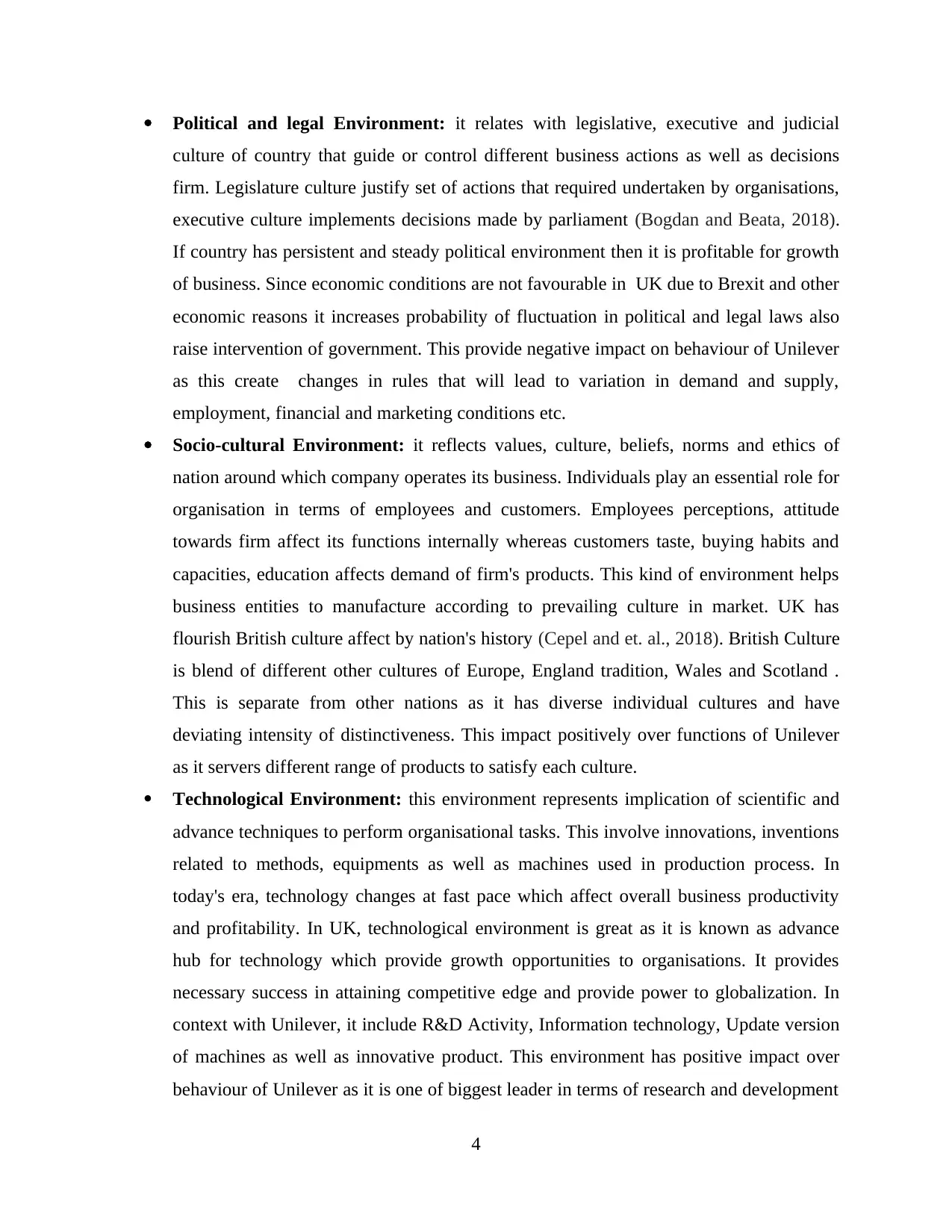
Political and legal Environment: it relates with legislative, executive and judicial
culture of country that guide or control different business actions as well as decisions
firm. Legislature culture justify set of actions that required undertaken by organisations,
executive culture implements decisions made by parliament (Bogdan and Beata, 2018).
If country has persistent and steady political environment then it is profitable for growth
of business. Since economic conditions are not favourable in UK due to Brexit and other
economic reasons it increases probability of fluctuation in political and legal laws also
raise intervention of government. This provide negative impact on behaviour of Unilever
as this create changes in rules that will lead to variation in demand and supply,
employment, financial and marketing conditions etc.
Socio-cultural Environment: it reflects values, culture, beliefs, norms and ethics of
nation around which company operates its business. Individuals play an essential role for
organisation in terms of employees and customers. Employees perceptions, attitude
towards firm affect its functions internally whereas customers taste, buying habits and
capacities, education affects demand of firm's products. This kind of environment helps
business entities to manufacture according to prevailing culture in market. UK has
flourish British culture affect by nation's history (Cepel and et. al., 2018). British Culture
is blend of different other cultures of Europe, England tradition, Wales and Scotland .
This is separate from other nations as it has diverse individual cultures and have
deviating intensity of distinctiveness. This impact positively over functions of Unilever
as it servers different range of products to satisfy each culture.
Technological Environment: this environment represents implication of scientific and
advance techniques to perform organisational tasks. This involve innovations, inventions
related to methods, equipments as well as machines used in production process. In
today's era, technology changes at fast pace which affect overall business productivity
and profitability. In UK, technological environment is great as it is known as advance
hub for technology which provide growth opportunities to organisations. It provides
necessary success in attaining competitive edge and provide power to globalization. In
context with Unilever, it include R&D Activity, Information technology, Update version
of machines as well as innovative product. This environment has positive impact over
behaviour of Unilever as it is one of biggest leader in terms of research and development
4
culture of country that guide or control different business actions as well as decisions
firm. Legislature culture justify set of actions that required undertaken by organisations,
executive culture implements decisions made by parliament (Bogdan and Beata, 2018).
If country has persistent and steady political environment then it is profitable for growth
of business. Since economic conditions are not favourable in UK due to Brexit and other
economic reasons it increases probability of fluctuation in political and legal laws also
raise intervention of government. This provide negative impact on behaviour of Unilever
as this create changes in rules that will lead to variation in demand and supply,
employment, financial and marketing conditions etc.
Socio-cultural Environment: it reflects values, culture, beliefs, norms and ethics of
nation around which company operates its business. Individuals play an essential role for
organisation in terms of employees and customers. Employees perceptions, attitude
towards firm affect its functions internally whereas customers taste, buying habits and
capacities, education affects demand of firm's products. This kind of environment helps
business entities to manufacture according to prevailing culture in market. UK has
flourish British culture affect by nation's history (Cepel and et. al., 2018). British Culture
is blend of different other cultures of Europe, England tradition, Wales and Scotland .
This is separate from other nations as it has diverse individual cultures and have
deviating intensity of distinctiveness. This impact positively over functions of Unilever
as it servers different range of products to satisfy each culture.
Technological Environment: this environment represents implication of scientific and
advance techniques to perform organisational tasks. This involve innovations, inventions
related to methods, equipments as well as machines used in production process. In
today's era, technology changes at fast pace which affect overall business productivity
and profitability. In UK, technological environment is great as it is known as advance
hub for technology which provide growth opportunities to organisations. It provides
necessary success in attaining competitive edge and provide power to globalization. In
context with Unilever, it include R&D Activity, Information technology, Update version
of machines as well as innovative product. This environment has positive impact over
behaviour of Unilever as it is one of biggest leader in terms of research and development
4
Paraphrase This Document
Need a fresh take? Get an instant paraphrase of this document with our AI Paraphraser
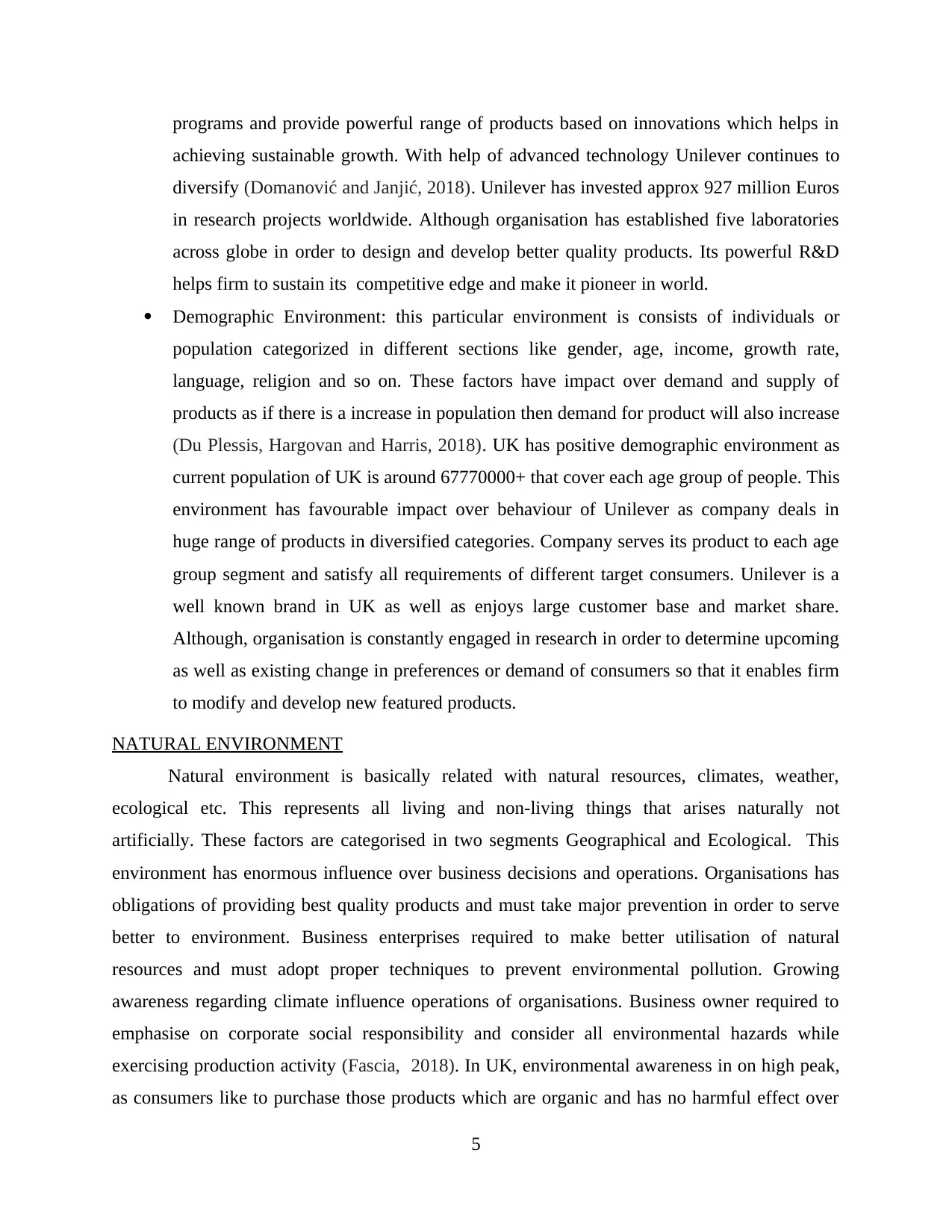
programs and provide powerful range of products based on innovations which helps in
achieving sustainable growth. With help of advanced technology Unilever continues to
diversify (Domanović and Janjić, 2018). Unilever has invested approx 927 million Euros
in research projects worldwide. Although organisation has established five laboratories
across globe in order to design and develop better quality products. Its powerful R&D
helps firm to sustain its competitive edge and make it pioneer in world.
Demographic Environment: this particular environment is consists of individuals or
population categorized in different sections like gender, age, income, growth rate,
language, religion and so on. These factors have impact over demand and supply of
products as if there is a increase in population then demand for product will also increase
(Du Plessis, Hargovan and Harris, 2018). UK has positive demographic environment as
current population of UK is around 67770000+ that cover each age group of people. This
environment has favourable impact over behaviour of Unilever as company deals in
huge range of products in diversified categories. Company serves its product to each age
group segment and satisfy all requirements of different target consumers. Unilever is a
well known brand in UK as well as enjoys large customer base and market share.
Although, organisation is constantly engaged in research in order to determine upcoming
as well as existing change in preferences or demand of consumers so that it enables firm
to modify and develop new featured products.
NATURAL ENVIRONMENT
Natural environment is basically related with natural resources, climates, weather,
ecological etc. This represents all living and non-living things that arises naturally not
artificially. These factors are categorised in two segments Geographical and Ecological. This
environment has enormous influence over business decisions and operations. Organisations has
obligations of providing best quality products and must take major prevention in order to serve
better to environment. Business enterprises required to make better utilisation of natural
resources and must adopt proper techniques to prevent environmental pollution. Growing
awareness regarding climate influence operations of organisations. Business owner required to
emphasise on corporate social responsibility and consider all environmental hazards while
exercising production activity (Fascia, 2018). In UK, environmental awareness in on high peak,
as consumers like to purchase those products which are organic and has no harmful effect over
5
achieving sustainable growth. With help of advanced technology Unilever continues to
diversify (Domanović and Janjić, 2018). Unilever has invested approx 927 million Euros
in research projects worldwide. Although organisation has established five laboratories
across globe in order to design and develop better quality products. Its powerful R&D
helps firm to sustain its competitive edge and make it pioneer in world.
Demographic Environment: this particular environment is consists of individuals or
population categorized in different sections like gender, age, income, growth rate,
language, religion and so on. These factors have impact over demand and supply of
products as if there is a increase in population then demand for product will also increase
(Du Plessis, Hargovan and Harris, 2018). UK has positive demographic environment as
current population of UK is around 67770000+ that cover each age group of people. This
environment has favourable impact over behaviour of Unilever as company deals in
huge range of products in diversified categories. Company serves its product to each age
group segment and satisfy all requirements of different target consumers. Unilever is a
well known brand in UK as well as enjoys large customer base and market share.
Although, organisation is constantly engaged in research in order to determine upcoming
as well as existing change in preferences or demand of consumers so that it enables firm
to modify and develop new featured products.
NATURAL ENVIRONMENT
Natural environment is basically related with natural resources, climates, weather,
ecological etc. This represents all living and non-living things that arises naturally not
artificially. These factors are categorised in two segments Geographical and Ecological. This
environment has enormous influence over business decisions and operations. Organisations has
obligations of providing best quality products and must take major prevention in order to serve
better to environment. Business enterprises required to make better utilisation of natural
resources and must adopt proper techniques to prevent environmental pollution. Growing
awareness regarding climate influence operations of organisations. Business owner required to
emphasise on corporate social responsibility and consider all environmental hazards while
exercising production activity (Fascia, 2018). In UK, environmental awareness in on high peak,
as consumers like to purchase those products which are organic and has no harmful effect over
5
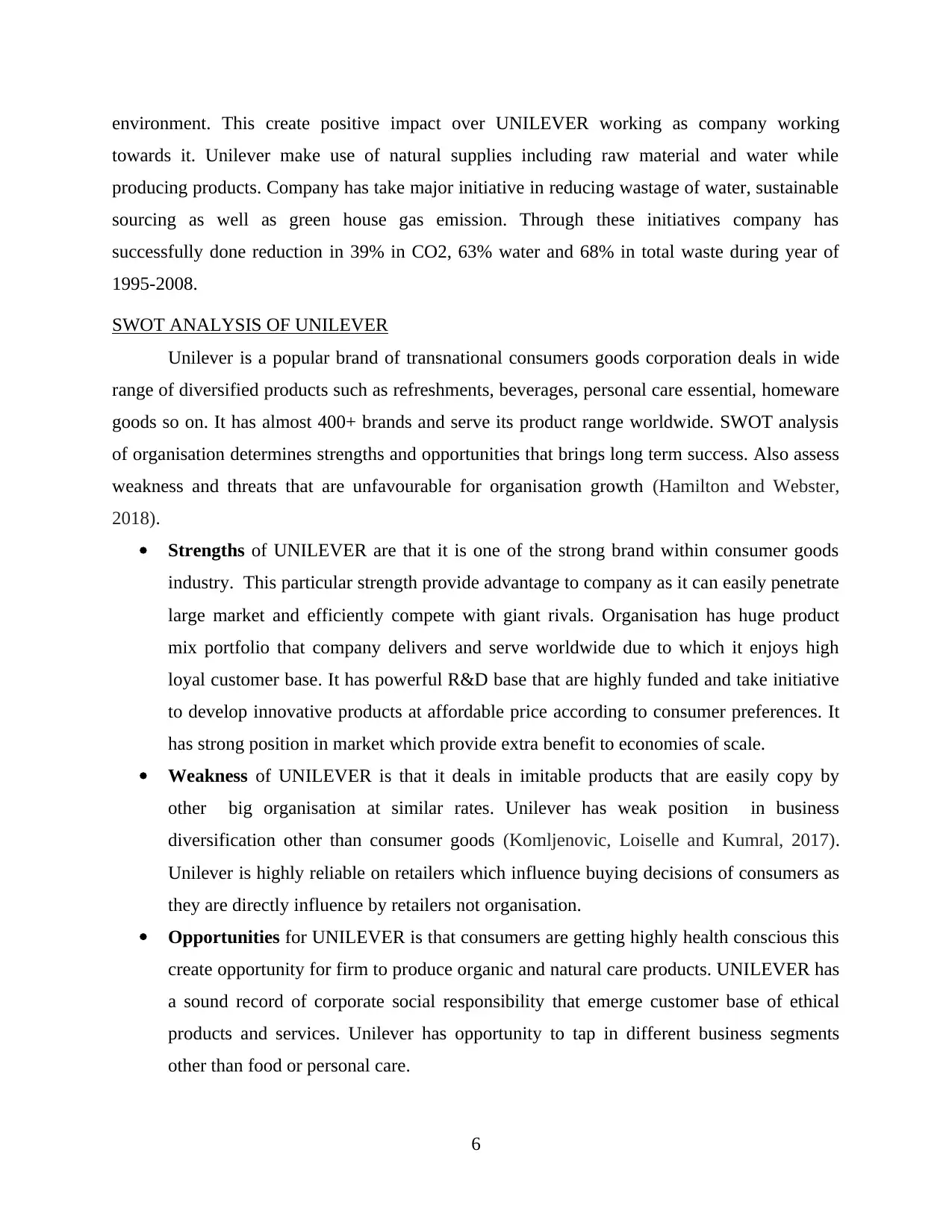
environment. This create positive impact over UNILEVER working as company working
towards it. Unilever make use of natural supplies including raw material and water while
producing products. Company has take major initiative in reducing wastage of water, sustainable
sourcing as well as green house gas emission. Through these initiatives company has
successfully done reduction in 39% in CO2, 63% water and 68% in total waste during year of
1995-2008.
SWOT ANALYSIS OF UNILEVER
Unilever is a popular brand of transnational consumers goods corporation deals in wide
range of diversified products such as refreshments, beverages, personal care essential, homeware
goods so on. It has almost 400+ brands and serve its product range worldwide. SWOT analysis
of organisation determines strengths and opportunities that brings long term success. Also assess
weakness and threats that are unfavourable for organisation growth (Hamilton and Webster,
2018).
Strengths of UNILEVER are that it is one of the strong brand within consumer goods
industry. This particular strength provide advantage to company as it can easily penetrate
large market and efficiently compete with giant rivals. Organisation has huge product
mix portfolio that company delivers and serve worldwide due to which it enjoys high
loyal customer base. It has powerful R&D base that are highly funded and take initiative
to develop innovative products at affordable price according to consumer preferences. It
has strong position in market which provide extra benefit to economies of scale.
Weakness of UNILEVER is that it deals in imitable products that are easily copy by
other big organisation at similar rates. Unilever has weak position in business
diversification other than consumer goods (Komljenovic, Loiselle and Kumral, 2017).
Unilever is highly reliable on retailers which influence buying decisions of consumers as
they are directly influence by retailers not organisation.
Opportunities for UNILEVER is that consumers are getting highly health conscious this
create opportunity for firm to produce organic and natural care products. UNILEVER has
a sound record of corporate social responsibility that emerge customer base of ethical
products and services. Unilever has opportunity to tap in different business segments
other than food or personal care.
6
towards it. Unilever make use of natural supplies including raw material and water while
producing products. Company has take major initiative in reducing wastage of water, sustainable
sourcing as well as green house gas emission. Through these initiatives company has
successfully done reduction in 39% in CO2, 63% water and 68% in total waste during year of
1995-2008.
SWOT ANALYSIS OF UNILEVER
Unilever is a popular brand of transnational consumers goods corporation deals in wide
range of diversified products such as refreshments, beverages, personal care essential, homeware
goods so on. It has almost 400+ brands and serve its product range worldwide. SWOT analysis
of organisation determines strengths and opportunities that brings long term success. Also assess
weakness and threats that are unfavourable for organisation growth (Hamilton and Webster,
2018).
Strengths of UNILEVER are that it is one of the strong brand within consumer goods
industry. This particular strength provide advantage to company as it can easily penetrate
large market and efficiently compete with giant rivals. Organisation has huge product
mix portfolio that company delivers and serve worldwide due to which it enjoys high
loyal customer base. It has powerful R&D base that are highly funded and take initiative
to develop innovative products at affordable price according to consumer preferences. It
has strong position in market which provide extra benefit to economies of scale.
Weakness of UNILEVER is that it deals in imitable products that are easily copy by
other big organisation at similar rates. Unilever has weak position in business
diversification other than consumer goods (Komljenovic, Loiselle and Kumral, 2017).
Unilever is highly reliable on retailers which influence buying decisions of consumers as
they are directly influence by retailers not organisation.
Opportunities for UNILEVER is that consumers are getting highly health conscious this
create opportunity for firm to produce organic and natural care products. UNILEVER has
a sound record of corporate social responsibility that emerge customer base of ethical
products and services. Unilever has opportunity to tap in different business segments
other than food or personal care.
6
You're viewing a preview
Unlock full access by subscribing today!
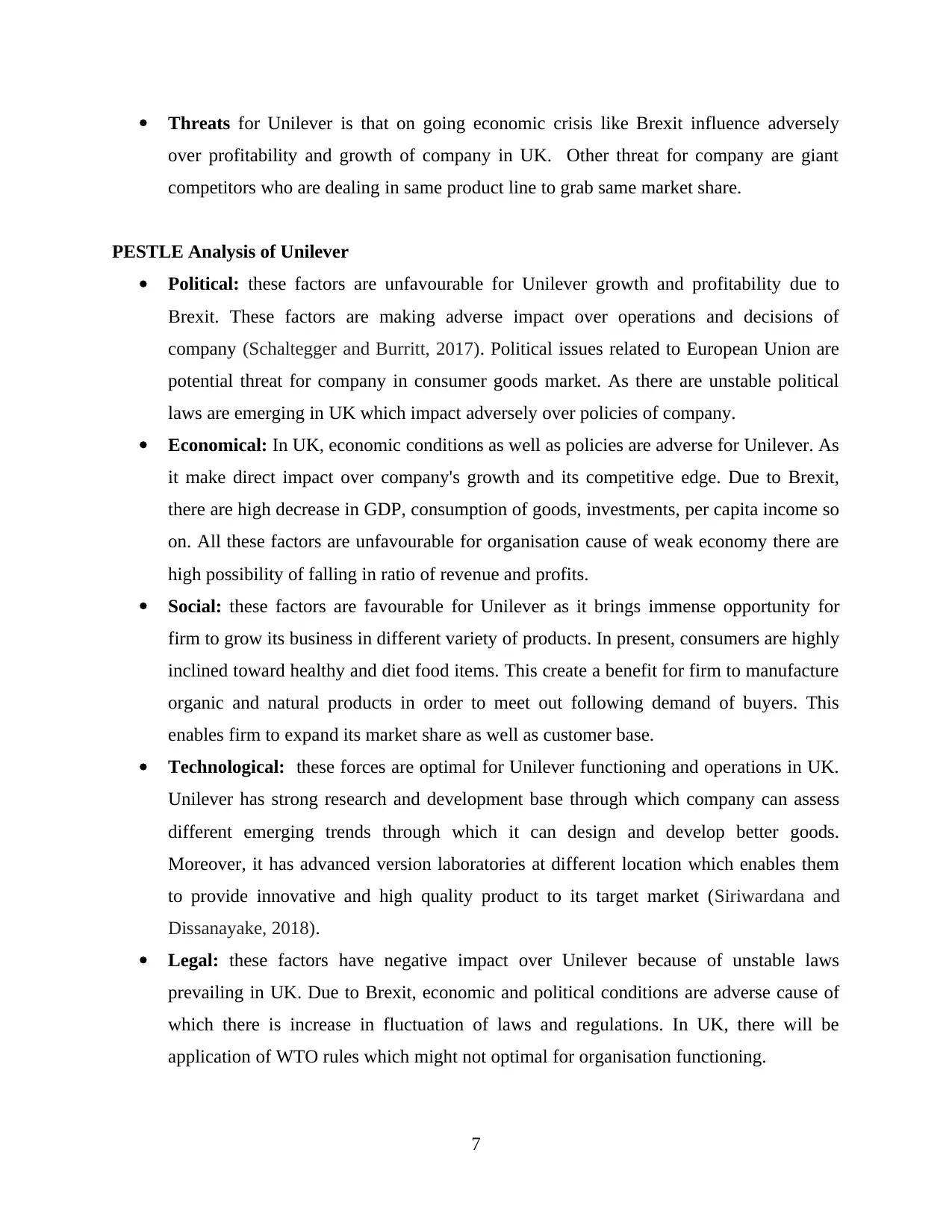
Threats for Unilever is that on going economic crisis like Brexit influence adversely
over profitability and growth of company in UK. Other threat for company are giant
competitors who are dealing in same product line to grab same market share.
PESTLE Analysis of Unilever
Political: these factors are unfavourable for Unilever growth and profitability due to
Brexit. These factors are making adverse impact over operations and decisions of
company (Schaltegger and Burritt, 2017). Political issues related to European Union are
potential threat for company in consumer goods market. As there are unstable political
laws are emerging in UK which impact adversely over policies of company.
Economical: In UK, economic conditions as well as policies are adverse for Unilever. As
it make direct impact over company's growth and its competitive edge. Due to Brexit,
there are high decrease in GDP, consumption of goods, investments, per capita income so
on. All these factors are unfavourable for organisation cause of weak economy there are
high possibility of falling in ratio of revenue and profits.
Social: these factors are favourable for Unilever as it brings immense opportunity for
firm to grow its business in different variety of products. In present, consumers are highly
inclined toward healthy and diet food items. This create a benefit for firm to manufacture
organic and natural products in order to meet out following demand of buyers. This
enables firm to expand its market share as well as customer base.
Technological: these forces are optimal for Unilever functioning and operations in UK.
Unilever has strong research and development base through which company can assess
different emerging trends through which it can design and develop better goods.
Moreover, it has advanced version laboratories at different location which enables them
to provide innovative and high quality product to its target market (Siriwardana and
Dissanayake, 2018).
Legal: these factors have negative impact over Unilever because of unstable laws
prevailing in UK. Due to Brexit, economic and political conditions are adverse cause of
which there is increase in fluctuation of laws and regulations. In UK, there will be
application of WTO rules which might not optimal for organisation functioning.
7
over profitability and growth of company in UK. Other threat for company are giant
competitors who are dealing in same product line to grab same market share.
PESTLE Analysis of Unilever
Political: these factors are unfavourable for Unilever growth and profitability due to
Brexit. These factors are making adverse impact over operations and decisions of
company (Schaltegger and Burritt, 2017). Political issues related to European Union are
potential threat for company in consumer goods market. As there are unstable political
laws are emerging in UK which impact adversely over policies of company.
Economical: In UK, economic conditions as well as policies are adverse for Unilever. As
it make direct impact over company's growth and its competitive edge. Due to Brexit,
there are high decrease in GDP, consumption of goods, investments, per capita income so
on. All these factors are unfavourable for organisation cause of weak economy there are
high possibility of falling in ratio of revenue and profits.
Social: these factors are favourable for Unilever as it brings immense opportunity for
firm to grow its business in different variety of products. In present, consumers are highly
inclined toward healthy and diet food items. This create a benefit for firm to manufacture
organic and natural products in order to meet out following demand of buyers. This
enables firm to expand its market share as well as customer base.
Technological: these forces are optimal for Unilever functioning and operations in UK.
Unilever has strong research and development base through which company can assess
different emerging trends through which it can design and develop better goods.
Moreover, it has advanced version laboratories at different location which enables them
to provide innovative and high quality product to its target market (Siriwardana and
Dissanayake, 2018).
Legal: these factors have negative impact over Unilever because of unstable laws
prevailing in UK. Due to Brexit, economic and political conditions are adverse cause of
which there is increase in fluctuation of laws and regulations. In UK, there will be
application of WTO rules which might not optimal for organisation functioning.
7
Paraphrase This Document
Need a fresh take? Get an instant paraphrase of this document with our AI Paraphraser
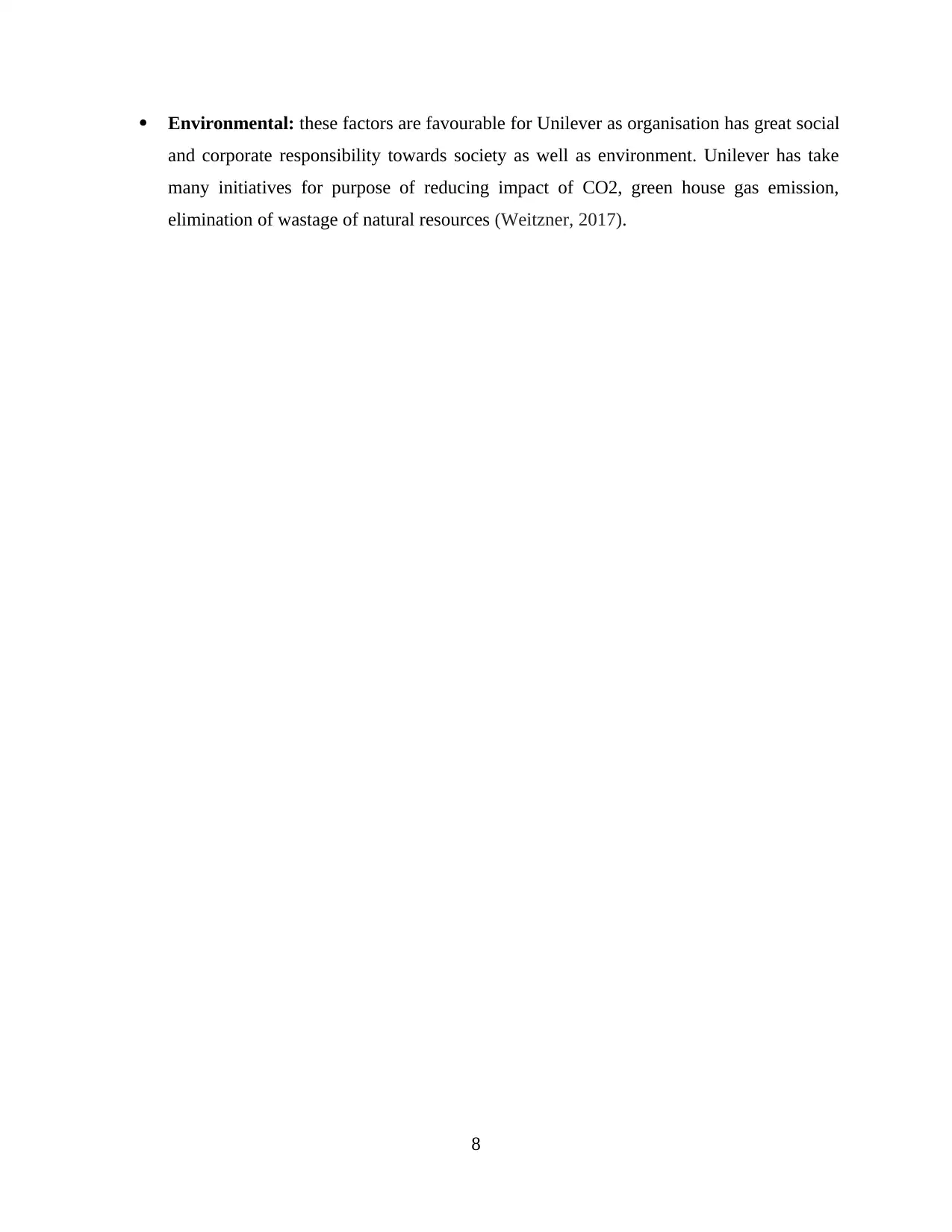
Environmental: these factors are favourable for Unilever as organisation has great social
and corporate responsibility towards society as well as environment. Unilever has take
many initiatives for purpose of reducing impact of CO2, green house gas emission,
elimination of wastage of natural resources (Weitzner, 2017).
8
and corporate responsibility towards society as well as environment. Unilever has take
many initiatives for purpose of reducing impact of CO2, green house gas emission,
elimination of wastage of natural resources (Weitzner, 2017).
8
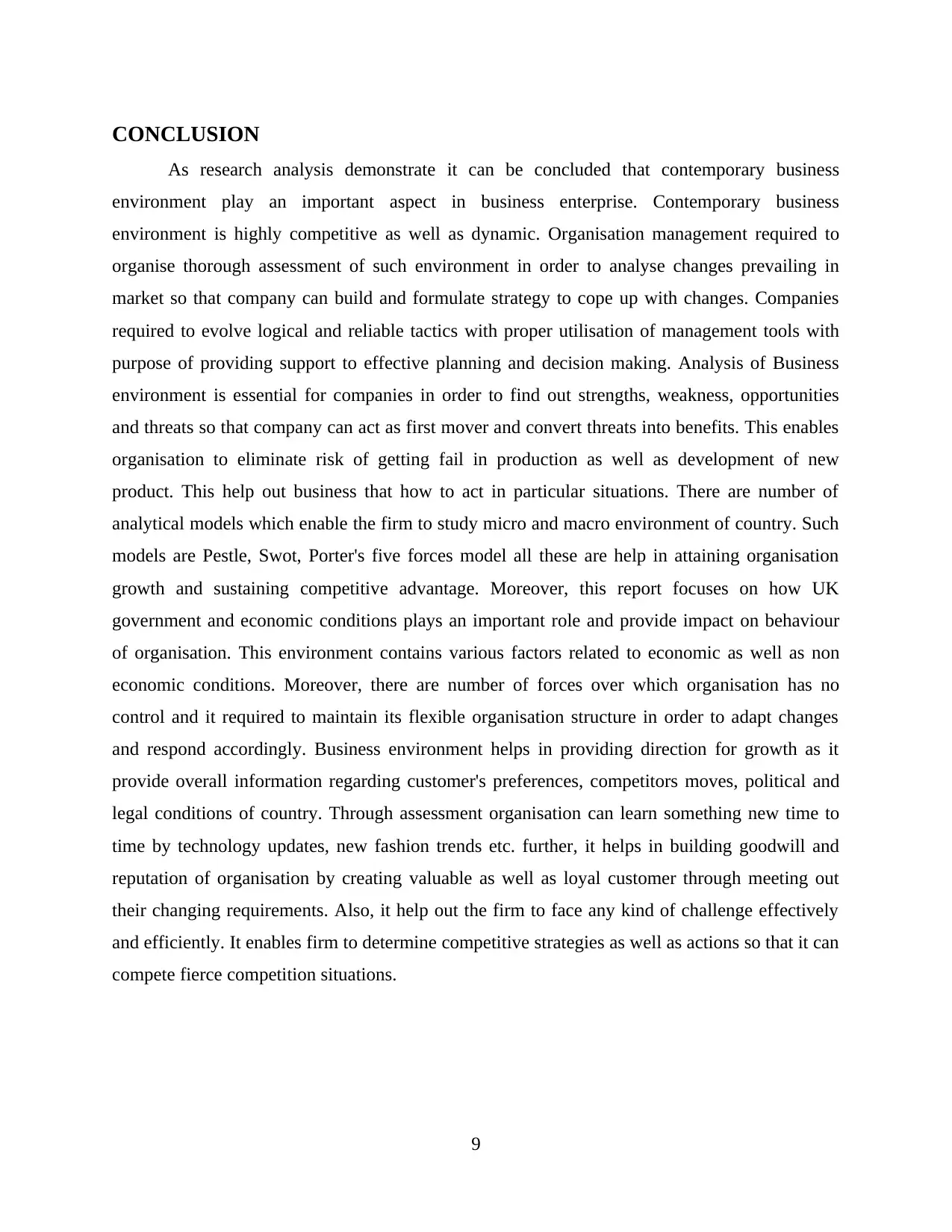
CONCLUSION
As research analysis demonstrate it can be concluded that contemporary business
environment play an important aspect in business enterprise. Contemporary business
environment is highly competitive as well as dynamic. Organisation management required to
organise thorough assessment of such environment in order to analyse changes prevailing in
market so that company can build and formulate strategy to cope up with changes. Companies
required to evolve logical and reliable tactics with proper utilisation of management tools with
purpose of providing support to effective planning and decision making. Analysis of Business
environment is essential for companies in order to find out strengths, weakness, opportunities
and threats so that company can act as first mover and convert threats into benefits. This enables
organisation to eliminate risk of getting fail in production as well as development of new
product. This help out business that how to act in particular situations. There are number of
analytical models which enable the firm to study micro and macro environment of country. Such
models are Pestle, Swot, Porter's five forces model all these are help in attaining organisation
growth and sustaining competitive advantage. Moreover, this report focuses on how UK
government and economic conditions plays an important role and provide impact on behaviour
of organisation. This environment contains various factors related to economic as well as non
economic conditions. Moreover, there are number of forces over which organisation has no
control and it required to maintain its flexible organisation structure in order to adapt changes
and respond accordingly. Business environment helps in providing direction for growth as it
provide overall information regarding customer's preferences, competitors moves, political and
legal conditions of country. Through assessment organisation can learn something new time to
time by technology updates, new fashion trends etc. further, it helps in building goodwill and
reputation of organisation by creating valuable as well as loyal customer through meeting out
their changing requirements. Also, it help out the firm to face any kind of challenge effectively
and efficiently. It enables firm to determine competitive strategies as well as actions so that it can
compete fierce competition situations.
9
As research analysis demonstrate it can be concluded that contemporary business
environment play an important aspect in business enterprise. Contemporary business
environment is highly competitive as well as dynamic. Organisation management required to
organise thorough assessment of such environment in order to analyse changes prevailing in
market so that company can build and formulate strategy to cope up with changes. Companies
required to evolve logical and reliable tactics with proper utilisation of management tools with
purpose of providing support to effective planning and decision making. Analysis of Business
environment is essential for companies in order to find out strengths, weakness, opportunities
and threats so that company can act as first mover and convert threats into benefits. This enables
organisation to eliminate risk of getting fail in production as well as development of new
product. This help out business that how to act in particular situations. There are number of
analytical models which enable the firm to study micro and macro environment of country. Such
models are Pestle, Swot, Porter's five forces model all these are help in attaining organisation
growth and sustaining competitive advantage. Moreover, this report focuses on how UK
government and economic conditions plays an important role and provide impact on behaviour
of organisation. This environment contains various factors related to economic as well as non
economic conditions. Moreover, there are number of forces over which organisation has no
control and it required to maintain its flexible organisation structure in order to adapt changes
and respond accordingly. Business environment helps in providing direction for growth as it
provide overall information regarding customer's preferences, competitors moves, political and
legal conditions of country. Through assessment organisation can learn something new time to
time by technology updates, new fashion trends etc. further, it helps in building goodwill and
reputation of organisation by creating valuable as well as loyal customer through meeting out
their changing requirements. Also, it help out the firm to face any kind of challenge effectively
and efficiently. It enables firm to determine competitive strategies as well as actions so that it can
compete fierce competition situations.
9
You're viewing a preview
Unlock full access by subscribing today!
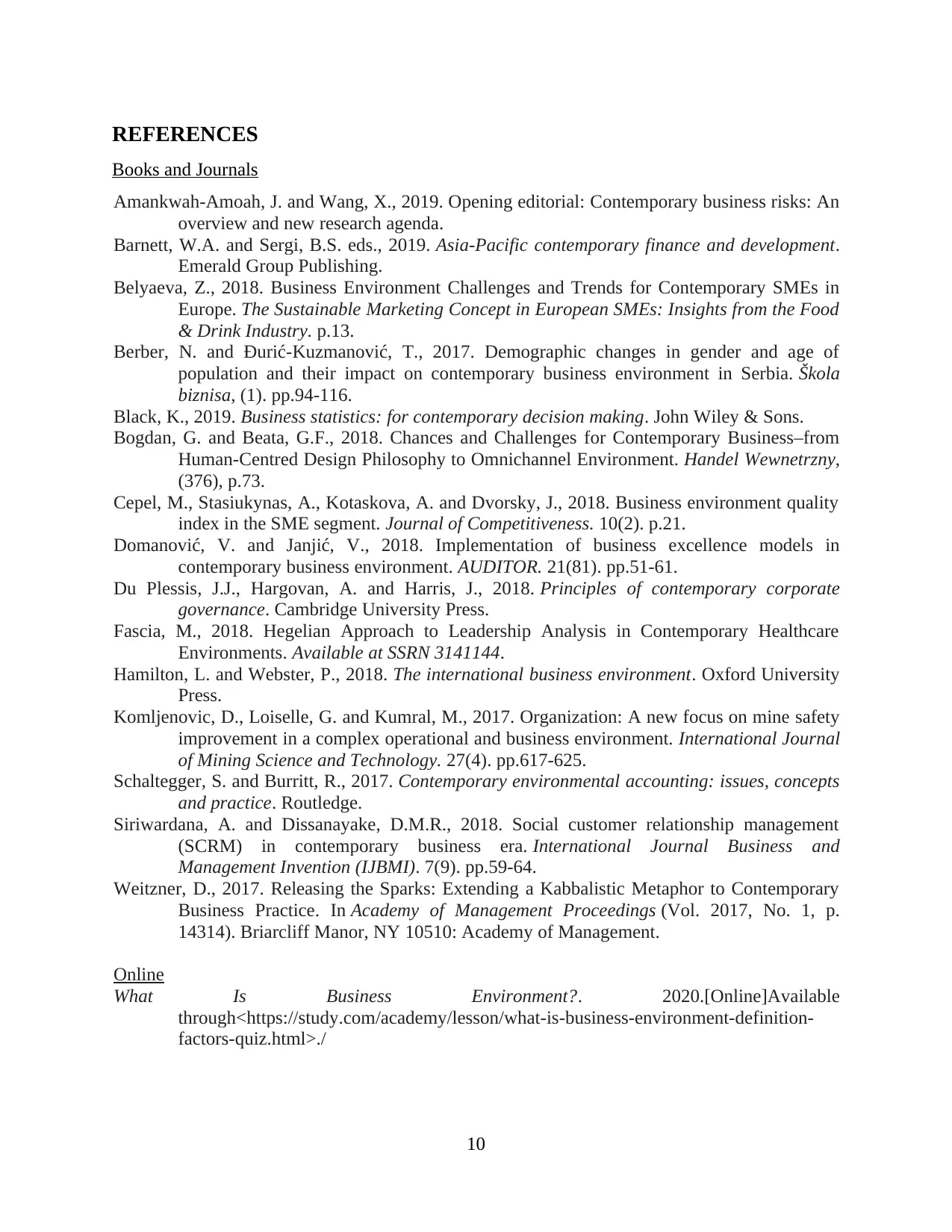
REFERENCES
Books and Journals
Amankwah-Amoah, J. and Wang, X., 2019. Opening editorial: Contemporary business risks: An
overview and new research agenda.
Barnett, W.A. and Sergi, B.S. eds., 2019. Asia-Pacific contemporary finance and development.
Emerald Group Publishing.
Belyaeva, Z., 2018. Business Environment Challenges and Trends for Contemporary SMEs in
Europe. The Sustainable Marketing Concept in European SMEs: Insights from the Food
& Drink Industry. p.13.
Berber, N. and Đurić-Kuzmanović, T., 2017. Demographic changes in gender and age of
population and their impact on contemporary business environment in Serbia. Škola
biznisa, (1). pp.94-116.
Black, K., 2019. Business statistics: for contemporary decision making. John Wiley & Sons.
Bogdan, G. and Beata, G.F., 2018. Chances and Challenges for Contemporary Business–from
Human-Centred Design Philosophy to Omnichannel Environment. Handel Wewnetrzny,
(376), p.73.
Cepel, M., Stasiukynas, A., Kotaskova, A. and Dvorsky, J., 2018. Business environment quality
index in the SME segment. Journal of Competitiveness. 10(2). p.21.
Domanović, V. and Janjić, V., 2018. Implementation of business excellence models in
contemporary business environment. AUDITOR. 21(81). pp.51-61.
Du Plessis, J.J., Hargovan, A. and Harris, J., 2018. Principles of contemporary corporate
governance. Cambridge University Press.
Fascia, M., 2018. Hegelian Approach to Leadership Analysis in Contemporary Healthcare
Environments. Available at SSRN 3141144.
Hamilton, L. and Webster, P., 2018. The international business environment. Oxford University
Press.
Komljenovic, D., Loiselle, G. and Kumral, M., 2017. Organization: A new focus on mine safety
improvement in a complex operational and business environment. International Journal
of Mining Science and Technology. 27(4). pp.617-625.
Schaltegger, S. and Burritt, R., 2017. Contemporary environmental accounting: issues, concepts
and practice. Routledge.
Siriwardana, A. and Dissanayake, D.M.R., 2018. Social customer relationship management
(SCRM) in contemporary business era. International Journal Business and
Management Invention (IJBMI). 7(9). pp.59-64.
Weitzner, D., 2017. Releasing the Sparks: Extending a Kabbalistic Metaphor to Contemporary
Business Practice. In Academy of Management Proceedings (Vol. 2017, No. 1, p.
14314). Briarcliff Manor, NY 10510: Academy of Management.
Online
What Is Business Environment?. 2020.[Online]Available
through<https://study.com/academy/lesson/what-is-business-environment-definition-
factors-quiz.html>./
10
Books and Journals
Amankwah-Amoah, J. and Wang, X., 2019. Opening editorial: Contemporary business risks: An
overview and new research agenda.
Barnett, W.A. and Sergi, B.S. eds., 2019. Asia-Pacific contemporary finance and development.
Emerald Group Publishing.
Belyaeva, Z., 2018. Business Environment Challenges and Trends for Contemporary SMEs in
Europe. The Sustainable Marketing Concept in European SMEs: Insights from the Food
& Drink Industry. p.13.
Berber, N. and Đurić-Kuzmanović, T., 2017. Demographic changes in gender and age of
population and their impact on contemporary business environment in Serbia. Škola
biznisa, (1). pp.94-116.
Black, K., 2019. Business statistics: for contemporary decision making. John Wiley & Sons.
Bogdan, G. and Beata, G.F., 2018. Chances and Challenges for Contemporary Business–from
Human-Centred Design Philosophy to Omnichannel Environment. Handel Wewnetrzny,
(376), p.73.
Cepel, M., Stasiukynas, A., Kotaskova, A. and Dvorsky, J., 2018. Business environment quality
index in the SME segment. Journal of Competitiveness. 10(2). p.21.
Domanović, V. and Janjić, V., 2018. Implementation of business excellence models in
contemporary business environment. AUDITOR. 21(81). pp.51-61.
Du Plessis, J.J., Hargovan, A. and Harris, J., 2018. Principles of contemporary corporate
governance. Cambridge University Press.
Fascia, M., 2018. Hegelian Approach to Leadership Analysis in Contemporary Healthcare
Environments. Available at SSRN 3141144.
Hamilton, L. and Webster, P., 2018. The international business environment. Oxford University
Press.
Komljenovic, D., Loiselle, G. and Kumral, M., 2017. Organization: A new focus on mine safety
improvement in a complex operational and business environment. International Journal
of Mining Science and Technology. 27(4). pp.617-625.
Schaltegger, S. and Burritt, R., 2017. Contemporary environmental accounting: issues, concepts
and practice. Routledge.
Siriwardana, A. and Dissanayake, D.M.R., 2018. Social customer relationship management
(SCRM) in contemporary business era. International Journal Business and
Management Invention (IJBMI). 7(9). pp.59-64.
Weitzner, D., 2017. Releasing the Sparks: Extending a Kabbalistic Metaphor to Contemporary
Business Practice. In Academy of Management Proceedings (Vol. 2017, No. 1, p.
14314). Briarcliff Manor, NY 10510: Academy of Management.
Online
What Is Business Environment?. 2020.[Online]Available
through<https://study.com/academy/lesson/what-is-business-environment-definition-
factors-quiz.html>./
10
1 out of 13
Related Documents
Your All-in-One AI-Powered Toolkit for Academic Success.
+13062052269
info@desklib.com
Available 24*7 on WhatsApp / Email
![[object Object]](/_next/static/media/star-bottom.7253800d.svg)
Unlock your academic potential
© 2024 | Zucol Services PVT LTD | All rights reserved.





